SPECIAL FOCUS: REGIONAL DEFENSE BUSINESSES





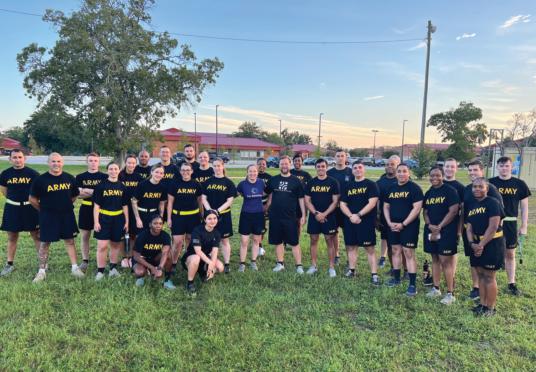 By Stephanie Meador
By Stephanie Meador
Daphne Sanitz, a Veteran entrepreneur, has made quite the name for herself through her work of “preserving what most throw away” here in Fayetteville. Sanitz has developed eight properties in downtown Fayetteville including the building at 108 Person St. which now hosts the popular restaurant CIRCA 1800.

Imagine a U.S. Army where a soldier preparing to go through Ranger school pulls up an app on his phone and asks his unit’s dietician to create a custom meal plan to improve his performance, the personal trainer to develop a workout plan for better training outcomes and makes an appointment with behavioral health to discuss their anxiety.
Sanitz spoke with the Greater Fayetteville Business Journal about her latest project, the Kress Lofts on Maxwell St.
The Fort Liberty Research Institute (FLRI) is working to make it possible with its latest joint venture, the CoachMePlus project.

Sanitz frst began the steps to renovating the Kress building in 2017.
FLRI was formed in 2018 in
Thursday, November 2, 2023
Highland Country Club, Fayetteville, NC
Ted Abernathy, a nationally respected economic strategist based in North Carolina, will talk about the Fayetteville region’s competitive strengths and weaknesses as well as how the changing landscape in global trade, technology and demographics will impact our community in 2023 and beyond.
Ted Abernathy is the Managing Partner of Economic Leadership, which helps communities and other clients analyze competitiveness, develop strategies and reimagine the future.


In the past nine years, Abernathy and his team have worked on 146 projects in more than 20 states and internationally. He currently serves as economic advisor to the Council of State Chambers and previously held a similar position to the Southern Governor’s Association.
Cape Fear Botanical Garden
Fayetteville, NC 28305


LABOR



4424 Bragg Blvd, Fayetteville, NC 28303 910-240-9697
bizfayetteville.com
PUBLISHER
Marty Cayton martyc@bizfayetteville.com

EDITOR
Faith Hatton faithh@bizfayetteville.com
ASSISTANT EDITOR
Stephanie Meador stephaniem@bizfayetteville.com
CONTRIBUTING WRITERS
Kate Griffn
Diana Hansen
Kathie Harris
Suet Lee-Growney
Jenna Shackelford
Eddie Velazquez
CONTRIBUTING WRITER MARKETING CONTENT
Stacie Borrello
CONTRIBUTING DESIGNER
Samantha Lowe samanthal@bizfayetteville.com

ACCOUNT MANAGER
Marshall Waren marketing@bizfayetteville.com
ACCOUNTING
Priscilla Nelson billing@bizfayetteville
The Greater Fayetteville Business Journal is published twice a month throughout Fayetteville and the Cumberland County region. News related to the region’s business sector is posted daily at bizfayetteville.com.
SUBSCRIPTIONS
Your free trial of Greater Fayetteville Business Journal is ending soon.
To subscribe, call 910-240-9697 or visit bizfayetteville.com/ subscribe. Subscriptions cost $9.95 per month or $95 per year.
REPRINT
For article reprints, plaques and more contact Faith Hatton at 910-240-9697.
ADVERTISING
For advertising information, please email us at marketing@bizfayetteville.com or call 910-240-9697.
© Copyright 2023 Greater Fayetteville Business Journal
Since my last publisher’s comments, our empty nest has become less empty! My wife and I participated in a fundraising auction back on St. Patrick’s Day to help support the 50th anniversary of Carolina College of Biblical Studies! That’s where we learned of a beautiful dog breed called Mini Australian Labradoodle. Although we didn’t intend to get a pet that night, we fell in love with this type of dog at the event and our new dog owner adventure was started. We picked our new puppy up on Father’s Day and needless to say, we are both smitten. So with a new puppy, in order not to put her at risk, we have not been able to go anywhere until she receives all her shots.
That has enabled a lot of refection on my part, and a lot of two hour minimum excursions, since we cannot leave her in the crate longer than that yet.
Much of that refection has been on being thankful. I am thankful that I married way up! I’m thankful for faith, family and friends and thankful for our country and the freedoms we all enjoy.
As we wrap up the month of July with this issue, our focus is regional
defense contracting businesses and their tremendous impact on our local/regional economy. These companies support those that keep us free, and they are making a signifcant contribution here. We wanted our readers to know more about them.
Please also mark your calendars
for Sept. 26, which is the date of our next Power Breakfast called “Major Developments”.
Those in attendance will hear about the latest developments and growth challenges in our area related to real estate and construction for both residential and commercial. This is an extremely important topic for our community.
Lastly, we also want you to be aware of a new event we have planned the evening of Thursday, Nov. 2 called Health Care Heroes. We already have some great presenting sponsors for this event and we will recognize several individuals in healthcare. More to come on this event, and if you are interested in learning more, contact us at marketing@bizfayetteville.com.
Thanks for reading the Greater Fayetteville Business Journal! And Idgie says hi!
God Bless you and yours!

The City of Fayetteville has long since been the partner City to the Fort Liberty military installation. With a multimillion dollar military contracting industry in North Carolina’s 100 counties alone, local government contractors are working to serve their military community and stand out in their industries.
Walsingham Group is a federal contractor headquartered in Fayetteville, NC providing operations, maintenance and support for critical infrastructure and government-owned contractor-operated facilities. Founded in 2008, they recently celebrated their 15th year in business with a staff of a little under 300 employees including badged employees, subcontractors and vendors.
Though their operations span beyond the city and even the state, with a total of seven additional program specifc offces scattered throughout the country, leaders shared that Fayetteville is the best place for the company’s home base.
“For us, in order to be ultra responsive and move at the speed of special operations, we need to be here,” remarked Walsingham Group CEO Ed Petkovich.
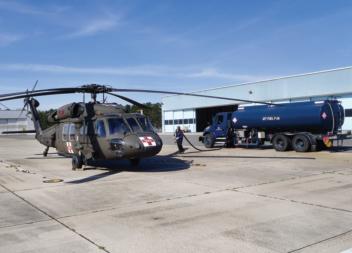
Walsingham Group handles contracts for a variety of projects including ones that support national critical infrastructure at various locations to include pipeline operations. Longer contracts such as 10 year contracts in particular help provide stability for the business.
One of the bigger projects Walsingham Group has going on at the moment is a 10 year contract with Sheppard Air Force Base, the Air Force’s training wing. Walsingham’s employees are responsible for the receipt and delivery of fuel to the base and directly into the fghter jets as well as quality control work.
“...It has been a challenge…We have a new union that we are working with and this is our frst contract with IAM [International Association of Machinists and Aerospace Workers]…So [we’re] working through the details of the collective bargaining agreement. Really, it’s [about] relationship building, getting used to each other and getting to know each other. You always want to do that and have a positive attitude and open communication because it is going to
be a long term relationship,” stated Petkovich.
One of their newer contracts is with the Ascent Program. This program is designed to help service members who are preparing to transition out of the military.
Walsingham Group considers community outreach to be one of the pillars of their organization. This outreach ranges from fnancial support to community service.
Shawn Stevens is the Director of
Operations for Walsing ham Group. Stevens formerly served in Special Operations and now he is happy to help transitioning military smoothly merge into the workforce.
“As a program manager I have to know the contract like the back of my hand. So I know all of the job descriptions, I know all of the positions that need flled and I’m also managing hours and the work, the workload and the quality of work. I’m responsible for the quality of work that everybody provides to the customer… My goal is to keep everything at 100 percent. The minute that somebody either resigns or they retire or the government says ‘We want to add another position to this contract.’ then I know my goal is to have it flled within two weeks. And I don’t normally have a problem doing that. Most of the time, I'll have a name to them within 48 hours,” shared Stevens.
The talent pool is another reason that being headquartered in Fayetteville is best for Walsingham Group.
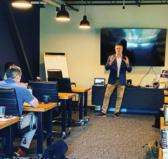
“...I think here in Fayetteville, we’re sitting in one of the biggest talent pools that a company could have,”
added Stevens.
Sarah Anderson has been the director of the Ascent Program with Walsingham Group for a year now and she meets one on one with airmen in her direct unit prior to their departure from the military so she can assist them in weighing their options for what’s next.
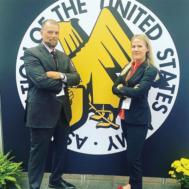
“I help them just personalize their plan to separate or retire. We also go over some nuances [involved with] going from the military to civilian life and looking at things like life insurance and the VA disability process, fnances, some things that are sort of glossed over from a big Air Force and big Army perspective when service members are leaving,” shared Anderson.
In addition to meeting with people one on one, Anderson also runs three to four workshops a year for the Ascent Program. The workshops are four days long and Anderson teaches alongside subject matter experts to speak on topics relevant to separating from the military and working in the civilian force.
Petkovich shared about the pride he feels in the culture he and Vice President of Walsingham Group Kelly George have created.
“Many people can be successful. Right? Few are signifcant. And for us, that's part of our culture. The thing that Kelly and I have done is we get to control our culture and that’s the most important thing for us and it’s to be signifcant, to give back to the communities,” stated Petkovich when asked to refect on the company’s progress over the years.
The company’s good work is even being noticed on a national stage.
In 2022 Walsingham Group received the Cogswell Award. The Cogswell Award is the most prestigious honor the Defense Counterintelligence and Security Agency (DCSA) can bestow to cleared industry. Of the more than 13,000 cleared contractors in the National Industrial Security Program (NISP), less than 1 percent are annually selected to receive this award.
To learn more about Walsingham group visit their website www.wgrp.com.




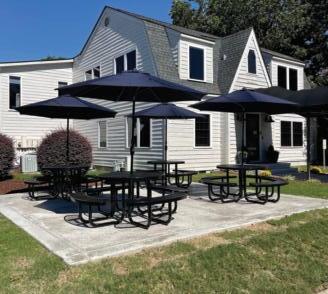
From HEALTH, page 1
partnership with The Geneva Foundation, Fort Liberty and Womack Army Medical Center to improve military human performance using scientifc research, analysis and implementation.
The institute employs 12 people locally, currently managing 34 research projects with Fort Liberty and the U.S. Marine Corps’s Camp Lejeune. Its employees include retired service members, veterans, military spouses and healthcare professionals. Geneva funds FLRI’s projects with a portion of its grant revenue, which ran upwards of $79 million last year.
FLRI’s CoachMePlus program is an effort to help the Army reach its goals under the new H2F effort or Holistic Health and Fitness Management System.
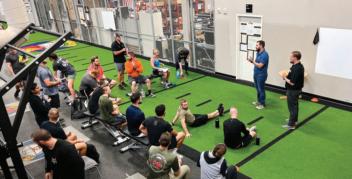
A 2021 Army report revealed 25 percent of reserve soldiers were obese, more than half of active duty soldiers sustained injuries annually and 10 percent of soldiers overall had sleep disorders. To reverse this trend, in 2020 the Army developed the H2F framework and the Warrior Performance Platform (WP2) to implement the changes. The H2F framework takes traditional metrics like physical and nutritional health and adds mental health, sleep and spiritual wellness.
The CoachMePlus (CMP) platform is one of several platforms the Army has operating trial runs throughout the branch, but the CMP is the only one that accounts for all fve health areas the WP2 is measuring.
“It’s the real difference between the three contenders last year and the reason I’m confdent we won the award again this year,” said LTC (Ret.) Stephen DeLellis, executive director of the FLRI. “When you’re talking about collegiate or professional health, they’re not asking about psychological and spiritual ftness. CMP took into consideration the psychological and spiritual health.”
For decades the Army’s physical ftness test included a timed run, pushups and sit-ups. The updated test includes physically strenuous tasks a soldier will likely encounter on a battlefeld.
In this same way, a soldier’s readiness for deployment is currently determined by readiness and availability.
“Readiness just means you did all your paperwork and you can go,” said DeLellis. “Availability means
that a soldier can get on a plane. In my opinion and the focus of CoachMePlus from the beginning, was adding capability.”
The program has about 9,000 volunteers at three military bases; Fort Sam Houston, Texas; Fort Gordon, Georgia; and Fort Liberty.
CMP gathers data from metrics that can be analyzed for care gaps and readiness levels. The U.S. Army Center for Initial Military Training is working on a management system for the data collected so the local leaders and unit commanders can leverage that information for readiness preparedness.
There are opportunities for soldiers to quantitatively and qualitatively record emotional factors like depression, anxiety and stress. Soldiers can even request assistance from specialists like behavioral health. DeLellis said that at this point, the program connects the soldier with a medical professional
but doesn’t track the results of any treatment. Prevention can be hard to measure, but DeLellis shared an example.
“At Fort Sam Houston, a few weeks after the option was added, there were several requests to speak to a chaplain. During an after-action review, the chaplains said because of that opportunity, something that could have happened didn’t.”
FLRI has paired with the 82nd Airborne Division to test the CMP capabilities within an active-duty unit that deploys often. FLRI has two personnel working with the unit’s H2F team of health professionals.
“As the H2F team meets with the warfghters from those brigades, they go back to our personnel and offer preferences, changes and feedback,” said DeLellis. “Our folks prepare documents for the CMP team, software designers and app managers to tweak the app.”
There is a desktop version of the platform and the app is downloaded on the personal phones of volunteer soldiers. Soldiers access it with their common access card or DoD ID number. The data will stay within the platform, even as the soldier moves from duty station to duty station. The Army doesn’t currently collect the data recorded.

The CMP connects the soldier to each H2F staff member so they can ask for individualized care.
“With CMP, it gives the steering wheel to the soldier,” shared Hunter Treuchet, the health and ftness director for the H2F team assigned to the 82nd Airborne Division’s 1st Brigade Combat Team. “They can track their workouts, track food intake, answer surveys, contact us and make appointments or request any kind of performance education
info they need.”
The back side of the platform is used for the leadership level and allows users to decide how much information they see, whether it be squad level or brigade level.
Now in phase two of the project, the Army hopes to expand the number of brigades supported by its H2F program and platforms like CMP. Currently, there are 28 brigades with H2F teams of medical personnel and subject matter experts. The goal is 130 brigades by 2030, with a fully developed and implemented system.
The results are still coming in on the effectiveness of a program like the CMP app.
“Essentially, it’s hard to quantify because we live in the human performance realm, which is somewhat subjective,” said Treuchet. “There’s a piece to the puzzle our providers are impacting and with CoachMePlus, it’s a way we can interact with soldiers, draw metrics in what we’re doing and be able to report to leaders to make better decisions about what their soldiers can do in a day.”
The biggest challenge so far has been getting soldiers and leaders to sign on to using a new app and tapping into a new data system. Treuchet said the common reasons for not adopting the app are that soldiers are happy with their current third-party app, don’t consider health a priority or don’t want to use their personal phones for work use.
Those soldiers volunteering typically prioritize their health, said Treuchet and the feedback has been overwhelmingly positive. The most signifcant use of the platform so far has been around physical training, where NCOs programming and implementing PT throughout their units can see real-time progress and make adjustments where needed.
“It’s a smooth, easy feedback system where we both, staff and NCOs, are looking at the same template of a training session and being able to interact and get feedback,” said Treuchet.
Treuchet says working with FLRI to bring the H2F’s goals to fruition has been a big help.
“Everyone we come in contact with is invested in the success of our soldiers,” said Treuchet. “One of the great things about this program is the supporting elements and organizations we can interact with who have soldier success on their mind. It makes everyone's job easier.”
NATALIE HAWKINS, President of the Moore County Economic Development Partnership (MCEDP), was appointed to the Board of Directors of the North Carolina Economic Development Association (NCEDA). Natalie will serve a three-year term on the board.
With over 900 members, NCEDA and its members lead efforts to promote North Carolina as an ideal destination for business investment, recruit new investments to the state and support the growth of existing businesses and entrepreneurial ventures.
NCEDA supports its members through a broad range of professional education and training, association networking opportunities and advocacy of their interests through collaboration with the Economic Development Partnership of North Carolina, the North Carolina Department of Commerce and state legislators.
“I am honored the nominating committee of past NCEDA presidents selected me to represent my profession on the board,” said Hawkins in a press release. “I look forward to serving and giving back to an association that has benefted me and my organization in so many ways since I joined MCEDP in 2021.”
Members of NCEDA include professional economic developers at the local, regional and state levels, as well as professionals in allied felds, such as architects, commercial real estate developers, utility company representatives and academics.
“NCEDA members play a vital role in ensuring a strong and healthy state economy. Supporting the association’s efforts to increase the knowledge of members across the state and advocate for legislation that supports local economic developers is critical to our future success. I am excited to take on this leadership role and am grateful for the confdence instilled in me by my peers,” Hawkins continued in a press release.
The Greater Fayetteville Chamber
What are you and your peers achieving? Have you reached a new goal? Have you acquired another business? Maybe your business has a new hire you would like to highlight.
Greater Fayetteville Business Journal wants to hear from you and your business to shine a spotlight on your accomplishments.
To nominate someone for GFBJ’s Achievers section, email editor@bizfayetteville.com with the subject line “Achiever.”
is thrilled to announce the arrival of their new Director of Events, JAMI MCLAUGHLIN. Along with all Chamber events, she will also oversee affliated groups: Military Affairs Council, Government Relations Committee and the Chamber Ambassador Program.
McLaughlin’s love for Chamber work and events is evident from her former positions as executive director of the Greater Spring Lake Chamber of Commerce, downtown development manager for the City of Fayetteville and as a former elected offcial in Cumberland County.

McLaughlin stated in a press release, “I’m excited to be joining such a strong team at the Greater Fayetteville Chamber. I believe in the work the Chamber does and look forward to helping our business community connect and grow through the Chamber’s active schedule of events. This is going to be fun!”
CEO of Greater Fayetteville Chamber, Nat Robertson added in a press release, “I am thrilled to welcome Jami McLaughlin to our team at the Greater Fayetteville Chamber. Her expertise and experience will be a valuable asset to our organization and community.”
Robeson Community College is pleased to announce that after a nationwide search, it has selected Dr. Johnny Smith to lead as the


CHRISTINE WALLACE was offcially appointed as the Tax Administrator for Harnett County at the Board of Commissioners Meeting on July 17. County Attorney Dwight Snow administered the oath of offce and Wallace’s son, Luke and husband, Jason, held the bible during the ceremony.

new Vice President of Instruction and Student Support Services.
Smith comes to RCC with a wealth of knowledge for the position with almost 30 years of experience in education. He also brings an energized spirit to campus that seemingly cannot be contained, as demonstrated by his love for people, shown through his words, expressions and laughter as he is seen greeting students, staff and faculty.
“I have a love for the community college system and I really wanted to give back and support student success,” stated Smith in a press release. “I have seen frsthand the impact that education and that community college has had on the lives of students and families and I want to be a part of that… I’m looking to add value to people, I’m looking for meaning… at this point in my life, meaning and adding value to people’s lives is true wealth for me.”
Smith started his career in K-12 education holding various positions for fve years until he discovered the joy of working with adult learners at Isothermal Community College.
While at Isothermal, he served in various positions including that of an adjunct instructor; health science advisor; director of the career center; dean of learning, support and retention; and dean of health and public services. Each experience helped to prepare him for the next few roles he would have including that of Vice President of Student Development Services and Vice President of Strategic Initiatives at Pitt Community College, Associate Vice Chancellor of External Affairs at Fayetteville State University and now Vice President at Robeson Community College.
Wallace has been serving as Acting Tax Administrator for the last 11 months. She has completed the necessary certifcation for the position.
“I am honored to have this opportunity to serve the Board of Commissioners and the citizens of Harnett County as Tax Administrator,” said Wallace in a press release. “Our departmental goal is to provide fair and equitable tax administration across the County while educating and informing the public of the requirements that govern the tax department. The dedicated staff in the tax department is eager to provide excellent customer service to meet the needs of our citizens.”
Her appointment will be for a four-year term beginning July 20, 2023, until July 19, 2027.
“Christine Wallace has done a phenomenal job as Acting Tax Administrator for the past eleven months. She has demonstrated that she is more than capable of fulflling the responsibilities of Tax Administrator and serving the citizens of Harnett County. We look forward to the work that she will do,” said Harnett County Manager Brent Trout in a press release.
Wallace has over 23 years of experience working for Harnett County government, serving as a Tax Assistant/Paralegal, GIS Technician, Real Property Appraiser, and Assistant Tax Administrator.





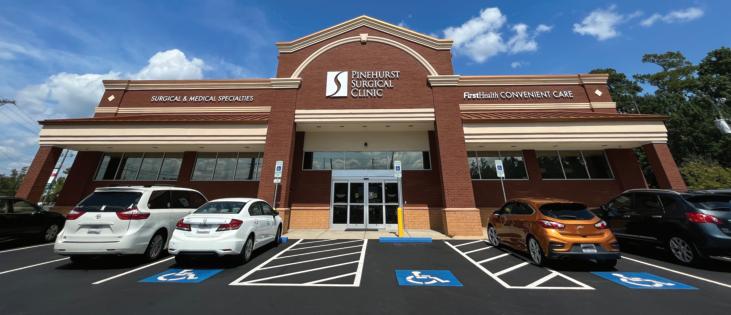
On May 1, PWC introduced a new optional Whole Business rate that features signifcantly lower rates (more than 46% lower than our current Off-Peak rates) for electricity used during Super Of-Peak Hours, 9:00 PM – 5:00 AM daily, all year long. Business customers who sign up for this option pay a slightly higher basic facility charge and Peak rate, while benefting from much lower rates during the nighttime hours.

Your business may be able to lower your electric bills with this rate plan. Some of the ways you can save money with this plan include doing things like:

• Charging feet-managed EVs, or providing managed EV charging for multi business/residential units, during Super-Off Peak hours

• Performing power-hungry tasks or running large machinery/ non-essential equipment between 9:00 PM and 5:00 AM

For more information, visit: FayPWC.com and click on the TOU Rates for Business in the business section of the website. Or call 910-483-1382 to speak with a PWC representative and learn how our new Whole Business electric rate may beneft your business.

When Robert Elliott, founder of the Veteran’s Farm of North Carolina, left the Marine Corps, agriculture was a sort of coping mechanism.
“When I tell the story, I always tell about the chicken that saved my life,” he said.
When Elliott left for the Marine Corps, having witnessed frsthand the struggle that many farmers face as he grew up watching his parents in the meat industry, he had no intention of returning to the life of agriculture. He explained that many children who grow up on farms feel the same way in their adult life: “They leave and they don’t want to come back to it because you’re seeing constant struggles with fnancial issues in agriculture – either that or regulatory issues that are coming up.”
He hoped that the Marine Corps would be easier, but after being on active duty for fve years, he was injured. After leaving the Marines, he worked with a DoD contractor from the same unit for the next 10 years and then the contract “went belly up.”
Like many veterans transitioning into civilian life, Elliott struggled with the change. “My frst year back home, away from the Marine Corps, was extremely diffcult for me and I became suicidal,” he said. “The only thing that seemed to help at the time was this chicken in my backyard and everything was pushing me back into the farm so I cranked back up.”
Knowing that he did not want to face the struggles that his family did growing up, Elliott “went and got as much business sense as [he] could into [his] head.” He analyzed fnancials and numbers. His work was primarily livestock-based.
He started making a living from a hog operation and then he received a small grant to buy chicken processing equipment for the farm.
“The organization that gave me the grant asked if I would come back and speak on my experience to folks that were interested in trying to get more veterans into agriculture,” Elliott explained. Major players like the Farm Bureau, Farm Credit, the VA and some veteran organizations were there.
His talk spread rapidly through media sources and then on to veterans. “I’m being contacted by veterans around North Carolina and the U.S.
wanting to know, ‘How do I get into what you do?’...And, at the time, I was like, ‘I don’t know. Come on out to the farm. I’ll show you what I’m doing.’ And that’s how the Veteran’s Farm was born.”
When Elliott began this new journey, he already had the 'basic farm kid knowledge,” but he quickly realized that the people who were reaching out to him did not.
“Long story short, I came down to Fort Bragg [now Fort Liberty] working for NC State to be a military liaison for the College of Ag down here part time. Fort Bragg [Liberty] was asking about an agricultural program, which is now known as the Soldier of Ag Program,” he said. Elliott built that and ran it for fve years and that laid the framework of the foundation so he could develop a curriculum and training for veterans.
The Veteran’s Farm is 53 acres and students in the program get to do a little bit of everything, starting with the basic concepts. Gardening, working with livestock, collecting eggs, meat processing, operating a tractor, carpentry, electrical work and plumbing are among the areas students learn about. “While the students are out here,” Elliott said, “they get a wide variety of instruction.”
The Farm offers a three month course that is very condensed but provides a 30,000 foot view of everything they might need to know and a six month program that allows them to take care of the farm completely on their own. As new students come in, Elliott said the programs mimic the military in that the senior enlisted students teach the junior enlisted students.
The Veteran’s Farm of NC allows veterans, active duty military and spouses in the program.
Now, the Veteran’s Farm offers safety and health components as well as a mental health component and the organization encourages spouses to be present for both. Elliott shared that many farms fail because of communication breakdowns between the farmer and spouse and that many farmers face fnancial diffculties. The idea is that they want to head off those issues. “Most farm startups end in the frst fve years,” Elliott said.
Moreover, the Veteran’s Farm aims to look at veteran suicide issues holistically and how those numbers can be decreased. The goal is to give veterans agricultural skills to turn them into a farmer; from there, the farm has equipment that they maintain that the veteran community can use and a network of roughly 1,000 farmer veterans throughout the state. When a veteran in the program is
staying local to North Carolina, Elliott plugs them into the network.
“What I’ve noticed over the years building the programs that are built, it became pretty much a solidifed suicide mitigation model disguised as an agricultural program,” he said. “All of it is meant to give a veteran purpose… connect them with a career … in order for them to have connections outside of the military.”
The Veteran’s Farm also has a counselor on board with a farming background who is licensed in family therapy to help students combat the mental health struggles they might be facing.
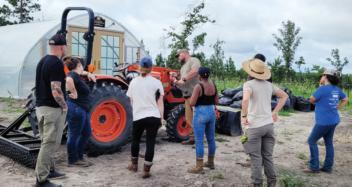
Currently, the Veteran’s Farm of NC operates through USDA funds through one of their sub agencies known as the National Institute of Food and Agriculture. Although that grant has been key to keeping the Farm going, the grant runs out next year. “Right now, we’re trying to aggressively do fundraising and fgure out how we’re going to keep this going,” Elliott said.
Elliott hopes the Farm can get another grant or reapply for the grant they received before. The program, right now, is completely free for veterans and their families and Elliott hopes that one day, they can turn their program into a certifcate program so they can accept GI Bill and tuition funds.
Businesses can help support the Veteran’s Farm of N.C. in a variety of ways.

• Visiting the website at VFNC.org to make a recurring donation of any size to help pay for supplies that students enrolled in the programs need.
• Making tax deductible material donations including, but not limited to, building materials, landscaping supplies, compost, trucks, or campers.
• Purchasing goods sold from the farm, including ornamental plants, vegetable plants, eggs, meat and poultry at Dirtbag Ales.
On Sept. 16, the Farm will host a Farm Day that brings in past and present students. The event will include food, activities, infatables and music. Money from admissions will go toward supporting the Farm.
To learn more about the Veteran’s Farm of NC and their programs or how to support the organization, visit VFNC.org.





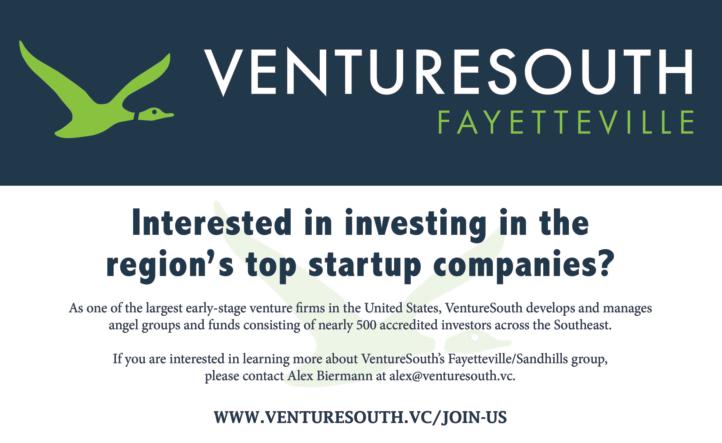
Located in Downtown Fayetteville, the Airborne and Special Operations Museum has been a longstanding fxture of military history and memorial for Fayetteville, NC. Offcially established on Aug. 16, 2000, the Airborne and Special Operations Museum is a free-to-enter, state-of-the-art facility that educates the community and honors the people who served. The quality, detail and professionalism is often compared by some to the museums of the Smithsonian Institution. The Airborne and Special Operations Museum lends a truly noble and professional presence to the City of Fayetteville.
“The U.S. Army Airborne and Special Operations Museum houses thousands of artifacts that honor and celebrate over 80 years of Army Airborne and Special Operations history,” shared Executive Director of the Airborne and Special Operations Museum Foundation Renee Lane.
In 2005, the ASOM Foundation gifted the Museum to the U.S. Army. The ASOM Foundation continues to operate and is solely responsible for community outreach and fundraising to sustain the Museum’s mission, programs and future exhibits.
“Within the Army organizational structure, the ASOM is part of the Fort Liberty Museums, under the umbrella of the Army Museum Enterprise, (AME), which falls under the U.S. Army Center of Military History (CMH), whose higher headquarters is the U.S. Army Training and Doctrine Command (TRADOC),” said Lane. While the Museum is nearing its 23rd year in operation, Lane shared that the Airborne and Special Operations Museum was in the works long before.
“Retired General James J. Lindsay was one of the driving forces behind the Museum. He said the frst meeting to discuss the possibility of a museum focusing on airborne and special operations troops was held during the frst week of August 1990,” said Lane. “The museum initially was going to be built on post and a groundbreaking was held, but fundraising fell through. Lindsay then called friends and business leaders in the Fayetteville community who embraced the museum concept. Lindsay credits local leaders for putting the museum near Hay Street, where it helped
transform the entrance to downtown and provide easy access off-post.”
The museum’s main exhibit immerses the visitors into the environments and throughout the notable events of the US Airborne and Special Operations’ history. The exhibits start in the Parachute Test Platoon of the 1940s and continue all the way to the War on Terrorism. The museum contains many top-notch dioramas and exhibits, with endless details to learn about.
“Designed by Winston-Salem
native Michael West, the exposed steel rafters [of the museum’s interior] are shaped to symbolize the wingspan of a C-47 aircraft, as well as the towers from which fedging paratroopers make their frst jumps,” said Lane.

The museum is expanding and growing with the passing times, with future plans of innovation.
“Work has begun on an updated storyline for the permanent gallery and in the next few years, visitors will experience a transformed gallery with new artifacts, immersive exhibits and interactive technologies to enhance the learning experience,” said Lane.

The theater portion of the museum sustained damage, which the museum hopes to remodel into room for additional exhibits.
“In addition to a permanent gallery renovation and expansion, a STEAM Innovation Lab will provide a dynamic educational experience for younger visitors. Our intent is to partner with the NC Department of Public Instruction and military equipment research and development companies in North Carolina to provide a unique learning experience for kindergarten through high school students,” shared Lane.
To keep up with the ever increasing costs, the Airborne and Special Operations Museum Foundation has currently raised $5 million, with an end goal of $15 million for the upcoming
renovations.
The Airborne and Special Operations Museum Foundation works alongside many local governments and organizations and school districts. The museum provides programs like the Memorial Paver and Monument Program, where one can pay tribute to their loved ones with engraved granite pavers.
The museum offers a Distinguished Speaker Series that features renowned authors and fgures for visitors of the museum to listen to.
“Our next Distinguished Speaker Series is with James Fenelon, author of “Four Hours of Fury”, the untold story of the American 17th Airborne Division’s combat jump over the Rhine River in March 1945,” shared Lane.
In partnership with Cool Spring Downtown District, the museum has the yearly “Field of Honor” where hundreds of sponsored fags will be set up on the museum parade feld, Sept. 11 to Nov. 12.
“This living display of heroism fies as a patriotic tribute to the strength and unity of Americans and honors all who are currently serving, those that have served and the men and women who have made the ultimate sacrifce for our nation’s security and freedom,” said Lane.
The Airborne and Special Operations Museum has been a fxture of many people’s lives for the past two decades. It has told the story of heroes gone before and inspired the hearts of many to remember and to learn from. With the high concentration of Special Forces and Airborne soldiers in the Fayetteville and Fort Liberty area, the Airborne and Special Forces Museum along with the Memorial Paver and Monument Program serves as a hub for connection within the military community, in addition to education and remembrance. In the past 23 years, the ASOM has given millions of visitors lasting memories of military history and the Airborne and Special Operations Soldiers who fought for liberty and freedom in many corners of the world.
Whether the visitor is a veteran, an active duty military service member, a family member, or someone with no familiarity with the military, there is something for everyone.






For all of 2023, the Emerging Technology Institute (ETI) has served as ground zero for budding technologies, future scientists and most recently, government contracts being connected and established.
Located at 16824 NC-211 in Red Springs, ETI’s campus has been the hot spot for events specifcally aimed at connecting local small businesses with large government buyers.
From June 5-9, the ETI campus was host to the United States Special Operations Command's third Technical Experimentation event for 2023. Over 400 daily participants and more than 60 vendors from around the world traveled to be part of the event, which gave each vendor one on one time with the primary buyers for different government organizations.
According to Founder and President of ETI James Freeman, the event allows both parties to gain valuable insight; the vendors get one on one time with buyers to help discover their needs and how their products can fll them and the buyers get up close and personal with vendors who can offer solutions.
“The process to do business with the government funnels people through different avenues. The USSOCOM event is an event where if you submit you get selected and you do all the necessary steps, you now get in front of the customers that you want and talk to them. And they validate what you’re doing based off of their mission priorities,” said Freeman. “So now you get to know what you need to build, what you need to change, what you don’t need to change.”
Anyone who was unable to attend or become a vendor will have other opportunities to get involved in fall of 2023. ETI is preparing to host their next event, the Defense Manufacturing Summit & Exhibition which will be held on the campus on Sept. 7 from 8:00 a.m. to 5:00 p.m. This will be the frst time ETI hosts this event, which will feature defense manufacturing networking opportunities. Guests will be able to learn about resources available to manufacturers in North Carolina, innovative technologies and new products and research specifcally in support of the warfghter. ETI partnered with North
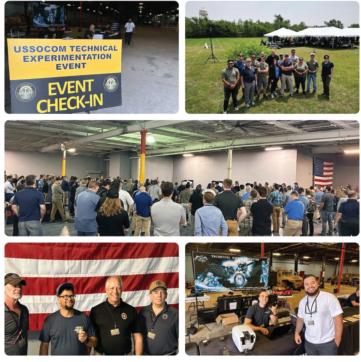
Carolina State University’s Industry Expansion Solutions Defense Industry Initiatives whose grant contributions helped make the event possible.
The event will include a trade show, which will showcase products and services from businesses in and beyond North Carolina.
“We’re working strong with North Carolina State University, very strong with the Fayetteville [Cumberland] Economic Development Corporation with Rob Patton and Children of Fallen Heroes, which is a nonproft. We’re gathering vendors to come demonstrate. We’ve got breakout sessions with the Defense Logistics Agency, the Small Business Administration, there’s a state legislator breakout session where discussion is going to happen with legislation. There’s so many different things happening back and forth throughout that day, people are going to once again have an opportunity to network to share ideas, to showcase technologies,” said Freeman.
The partnership between ETI and higher governments will continue to bring events to the area through late 2023 with another connectivity event being announced.
In partnership with the Offce of Undersecretary of Defense Research and Engineering, ETI will be host-
ing their Thunderstorm Technology
Discovery 23-5: “Golden Window” Innovative Medical & Casualty Logistics event from Oct. 23 - 27.
Expanding from a focus on manufacturing, this event will focus on innovative solutions for medical and casualty care logistics.
“This event is about innovation, innovative medical and casualty logistics. The purpose is how do we determine how to fy and use drones and other devices to deliver medical goods to the battlefeld. If someone gets shot, how do we use a new emerging technology to get to that person on the battlefeld? This will bring in, just like USSOCOM, 50, 60,70 vendors from all across the world who have these resources to do these types of techniques,” said Freeman.
As the opportunities arise for smaller area businesses to network and potentially be awarded large government contracts, Freeman shared that he hopes people in the community will take a chance and get involved in these events, and thanks the community for helping ETI grow to a place to be able to bring these events to the area.
“I think the biggest statement that I can make is that it would not be without the ecosystem that’s already existing in North Carolina. I say that because there’s great people and great organizations that are really trying to work together. And what happens is, you get all these folks together and everybody is doing these projects and getting these awards and opportunities. You start needing each other’s help so then they get subcontracts from you and they keep turning and then you get the interns from them. It just becomes kind of like a tornado effect. And that’s why North Carolina is the best place to do business. It’s not all about the opportunity, it’s the people that makes this place great,” said Freeman.
.... there's great people and great organizations that are really trying to work together.”
James Freeman Founder/President, ETI
“
